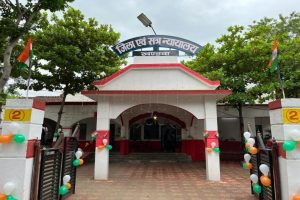History

Judicial History Of Khandwa :
In civil administration, Administration of justice in case of civil nature were resolved by the authorities but the cases which the officials could not dispose off were settled through the local resident panchayat. In the year 1846, the judicial resolution of civil matters started by the posting of Collector and Assistant Superintendent. At that time, Nimad district was mostly crime free in respect of criminal cases.
When the Nimad region was incorporated into the Central Province in 1864, a new setup was created for judicial administration. Sub divisions were made according to the area in the district. Some civil and criminal jurisdictions were also given in all these divisions. At that time all the courts were under the appellate jurisdiction of the Sessions Court headed by the Commissioner of Narmada Division.
In 1885–86, judicial restructuring was done and the Central Provinces Courts Act was implemented. Accordingly, Munsiff Court was established in Khandwa city for the disposal of civil cases. The Central Provinces Courts Act came into force from 14 May 1917 under which the Civil Judiciary was reconstituted and the Central Provinces was divided into 9 districts. Among those who were under the District and Sessions Judge, Khandwa was also a headquarters. After this reorganization, the district consisted of the District Judge, Subordinate Judge, Small Cause Court Judge and Munsif Court. In 1956, the jurisdiction of the District Judge was extended and he was given the right to hear appeals of value up to Rs.10,000 against the judgment and decree passed by the Civil Judge.
As a result of the implementation of the MP Civil Court Act 1958 from 01 January 1959, the work of judicial administration is being done under Khandwa district.
Court building of Khandwa district was constructed in 1901. Which is under the category of Heritage Court Building. In view of the appointments of judges from time to time for the increase in judicial cases and their speedy redressal, the new building was constructed in the year 2011, adjoining the old court building.
At present, two tehsils under Khandwa district have civil courts in Harsud and Punasa. Tehsil Court Harsud was established in the year 1962 and Tehsil Court Punasa was established in the year 2016.Earlier, Burhanpur was operated as a tehsil court under Khandwa district. As a result of the Tehsil Burhanpur being declared a district by the Madhya Pradesh government since the year 2003, currently all the cases related to the district Burhanupar are being heard in Burhanpur district itself.
The District Bar Association at Khandwa was constituted in the year 1897. At present, the Bar Association in consists of about 427 advocates. Bar Association Khandwa has also got the honor that one of his fellow learned lawyers, Mr. Bhagwantrao Mandloi, became the Chief Minister of the state of Madhya Pradesh. Those awarded the Padma Bhushan by the Government of India. Motilal Nehru Law College was established in 1960 by senior advocates of District Bar Association Khandwa which is running resently.
The Pride Of Khandwa :
One of the 12 Jyotirlingas is the Onkareshwar Jyotirlinga situated on the northern bank of the mother Narmada. is About 80 km from the district Khandwa, Lord Omkareshwar and Mamleshwar are enthroned at the said religious place. This temple was founded by King Mandhata. Omkareshwar Nagri is also known as Mandhata.
In Khandwa, Shri Dhuniwale Dada is the holy shrine of avadhoot sant Shri Keshavanandji Maharaj (elder grand father) and Shri Hariharanandji Maharaj (younger grandfather), who come from distant places to pay homage to the devotees every year and every year on the occasion of Gurupadhima Devotees visit Khandwa city for darshan.
Near the city Harsud is the tomb of Sant Singaji Maharaj, who is revered by the people of Nimad. The tomb has been kept safe by the Madhya Pradesh government keeping the public sentiments in view of the sinking of the tomb in Indira Sagar Project.
The poet of the nation, Shri Makhanlal Ji Chaturvedi, has been a karmasthaya khandwa. From here, he continuously fought for the independence of the country, contrary to British rule, while publishing the Karmaveer newspaper.
Pandit Ramnarayan Upadhyaya who belongs to khandwa was awarded the Padma Shri by the Government of India due to his special contribution to Nimadi folk literature.
Renowned cine actors Ashok Kumar, Anup Kumar and his younger brother great playback singer and actor Kishore Kumar were also born in Khandwa. His father was Mr. Keylal Ganguly who was also a famous advocate. The memorial of the late Kishore Kumar is located in Khandwa.



